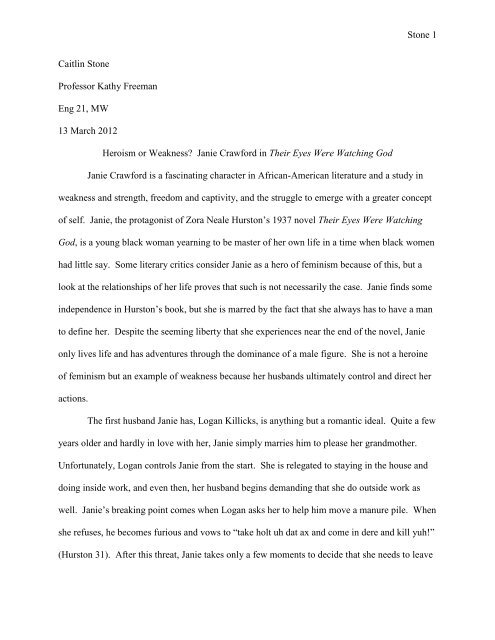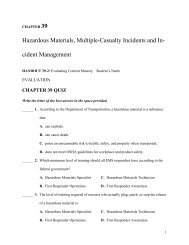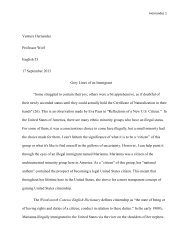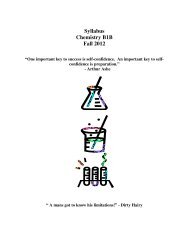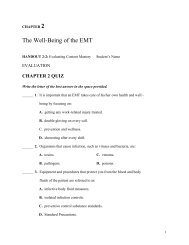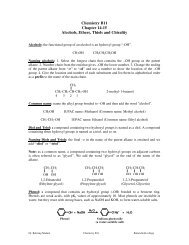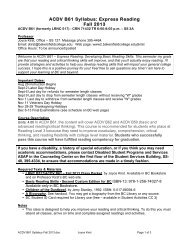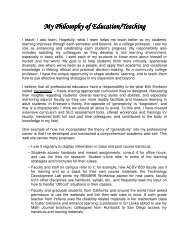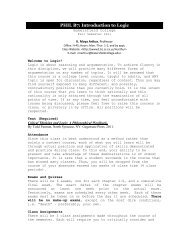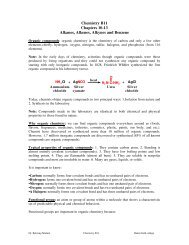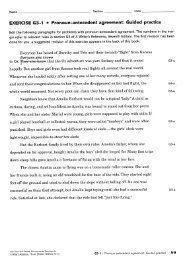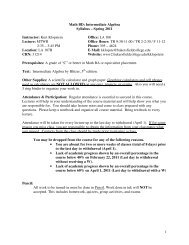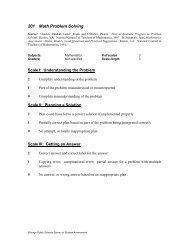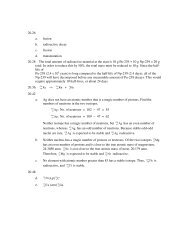View essay as PDF - Bakersfield College
View essay as PDF - Bakersfield College
View essay as PDF - Bakersfield College
You also want an ePaper? Increase the reach of your titles
YUMPU automatically turns print PDFs into web optimized ePapers that Google loves.
Stone 1<br />
Caitlin Stone<br />
Professor Kathy Freeman<br />
Eng 21, MW<br />
13 March 2012<br />
Heroism or Weakness Janie Crawford in Their Eyes Were Watching God<br />
Janie Crawford is a f<strong>as</strong>cinating character in African-American literature and a study in<br />
weakness and strength, freedom and captivity, and the struggle to emerge with a greater concept<br />
of self. Janie, the protagonist of Zora Neale Hurston’s 1937 novel Their Eyes Were Watching<br />
God, is a young black woman yearning to be m<strong>as</strong>ter of her own life in a time when black women<br />
had little say. Some literary critics consider Janie <strong>as</strong> a hero of feminism because of this, but a<br />
look at the relationships of her life proves that such is not necessarily the c<strong>as</strong>e. Janie finds some<br />
independence in Hurston’s book, but she is marred by the fact that she always h<strong>as</strong> to have a man<br />
to define her. Despite the seeming liberty that she experiences near the end of the novel, Janie<br />
only lives life and h<strong>as</strong> adventures through the dominance of a male figure. She is not a heroine<br />
of feminism but an example of weakness because her husbands ultimately control and direct her<br />
actions.<br />
The first husband Janie h<strong>as</strong>, Logan Killicks, is anything but a romantic ideal. Quite a few<br />
years older and hardly in love with her, Janie simply marries him to ple<strong>as</strong>e her grandmother.<br />
Unfortunately, Logan controls Janie from the start. She is relegated to staying in the house and<br />
doing inside work, and even then, her husband begins demanding that she do outside work <strong>as</strong><br />
well. Janie’s breaking point comes when Logan <strong>as</strong>ks her to help him move a manure pile. When<br />
she refuses, he becomes furious and vows to “take holt uh dat ax and come in dere and kill yuh!”<br />
(Hurston 31). After this threat, Janie takes only a few moments to decide that she needs to leave
Stone 2<br />
her marriage, yet she does not run to true independence. Instead, she runs into the arms of<br />
another man—a visionary stranger named Joe Starks, whom she met by the road. The re<strong>as</strong>on<br />
she leaves is because she h<strong>as</strong> a better offer than Logan. Consequently, while Janie’s departure is<br />
arguably a sign of strength, she falls right back into a relationship with a man who eventually<br />
becomes <strong>as</strong> controlling <strong>as</strong> Logan.<br />
Janie’s marriage to Joe appears promising at the outset, but it soon becomes apparent that<br />
Starks intends to keep Janie in her place. Janie and Joe go to the all-black town of Eatonville<br />
after they’re married, where Starks constructs a store and soon becomes mayor. Speeches are<br />
being made to celebrate his inauguration when someone requests that Janie make a speech. Joe<br />
immediately puts a stop to it. He tells everyone that his “wife don’t know nothin’ ‘bout no<br />
speech-makin’” (Hurston 43). Janie is not even allowed a chance to speak, and from that<br />
moment, she realizes that she h<strong>as</strong> no say in the marriage. It isn’t long before Starks is consigning<br />
her to work in the store and trying to control her appearance. As the years go on, he even<br />
becomes abusive. The most tragic example of his abuse is when he hits Janie one day in the<br />
store. For a long time, Joe h<strong>as</strong> been humiliating Janie about being an old woman, and the icing<br />
on the cake is when he insults her posterior. Janie fights back for the first time, repaying his<br />
insults in kind. Pride shattered, her husband responds with violence to the point where he<br />
“struck Janie with all his might and drove her from the store” (Hurston 80). He is so angry that<br />
he abuses her, yet Janie still stays with him. She doesn’t seek help or stand up for herself, but<br />
gives in to Joe’s control for the rest of their marriage—hardly a heroic characteristic.<br />
Tea Cake is the l<strong>as</strong>t man Janie marries, after Joe dies, and their relationship is marked by<br />
much more freedom. However, even with a more understanding husband, there are still times<br />
when Janie is told what to do. Janie and Tea Cake spend the night together once, before they’re
Stone 3<br />
married, and Janie wants to make him breakf<strong>as</strong>t the next morning. But Tea Cake “wouldn’t let<br />
her get him any breakf<strong>as</strong>t at all…he made her stay where she w<strong>as</strong>” (Hurston 107). Though this<br />
is arguably a loving act, Tea Cake is the one dictating what Janie is doing. Though they seem to<br />
have a freer relationship, Janie never quite gains true liberation. As Hurston expert Cheryl Wall<br />
says, “even Tea Cake, strongly idealized character though he is, h<strong>as</strong> had difficulty accepting<br />
Janie’s full participation in their life together” (Wall 688). Tea Cake is the one who determines<br />
where they get married, where they live, and whether or not they stay in the face of an oncoming<br />
storm. Janie’s marriage to him is a marked improvement, but even so, she doesn’t find true<br />
freedom until he’s gone. Thus, she is not a paragon of feminist valor, but a weak-willed woman,<br />
driven by the dominance of the husbands in her life. Her independence is always limited by<br />
men, and so she is an example of a feminist antihero more than anything else.
Stone 4<br />
Works Cited<br />
Hurston, Zora Neal. Their Eyes Were Watching God. New York: Harper, 2006. Print.<br />
Wall, Cheryl A. “Zora Neale Hurston: Changing Her Own Words.” Harlem Renaissance: A<br />
Gale Critical Companion. Ed. Janet Witalec. Vol. 2. Detroit: Thomson/Gale, 2003.<br />
678-90. Print.<br />
Word Count: 841


